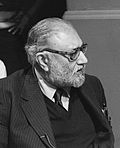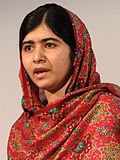Laureates
Pakistani citizens
As of 2022 [update] , the list of Pakistani Nobel Prize laureates consists of following people. [1]
| Year | Portrait | Laureate | Subject | Rationale |
|---|---|---|---|---|
| 1979 |  | Abdus Salam | Physics | Awarded jointly to Sheldon Glashow, Abdus Salam and Steven Weinberg – "for their contributions to the theory of the unified weak and electromagnetic interaction between elementary particles, including, inter alia, the prediction of the weak neutral current" [2] [3] |
| 2014 |  | Malala Yousafzai | Peace | Awarded jointly to Kailash Satyarthi and Malala Yousafzai – "for their struggle against the suppression of children and young people and for the right of all children to education." [4] |
Nobel laureates born in region that later become Pakistan
The laureates below were born in the region of Pakistan during the British Raj period.
| Year | Laureate | Country | Subject | Rationale | |
|---|---|---|---|---|---|
| 1968 |  | Har Gobind Khorana (born in Raipur, Punjab Province, British India) | Physiology or Medicine | Awarded along with Robert W. Holley and Marshall W. Nirenberg – "for their interpretation of the genetic code and its function in protein synthesis." [5] | |
| 1983 |  | Subrahmanyan Chandrasekhar (born in Lahore, Punjab Province, British India) | Physics | "For his theoretical studies of the physical processes of importance to the structure and evolution of the stars." [6] | |
